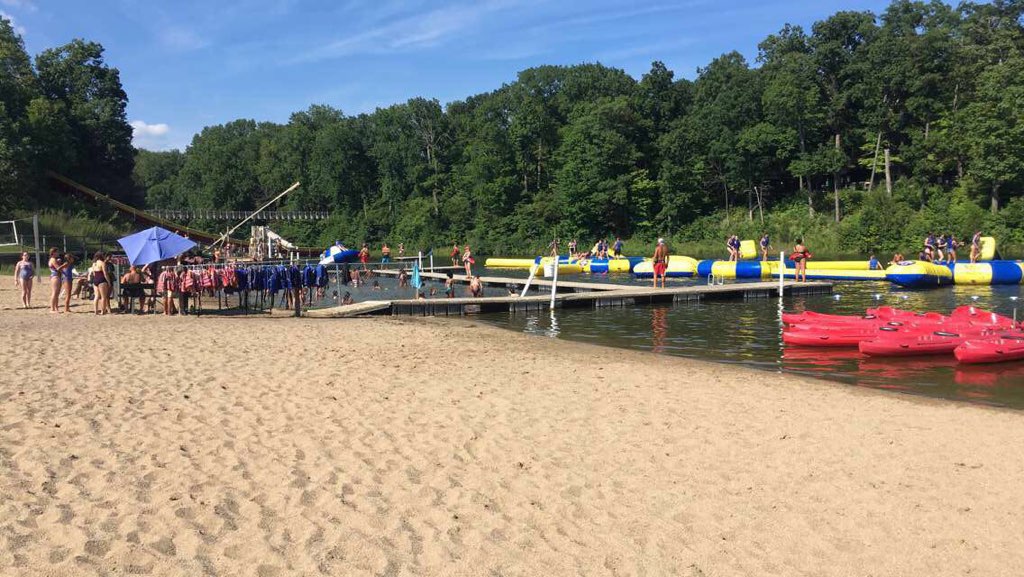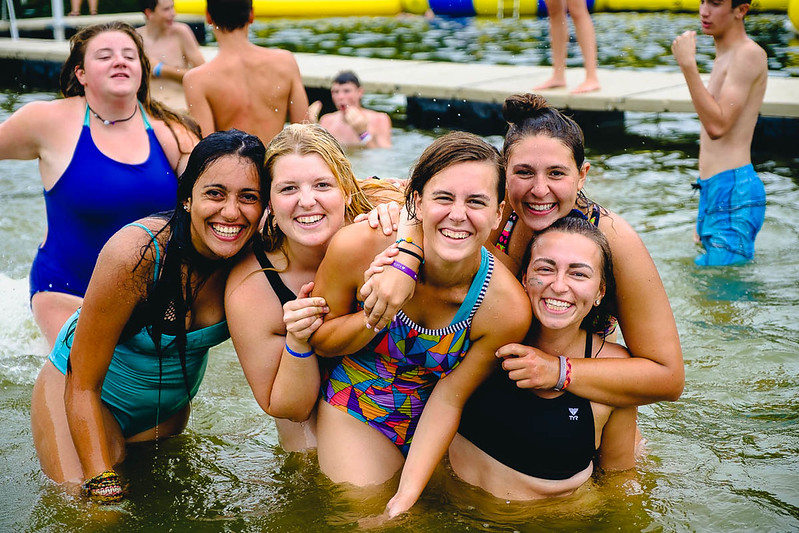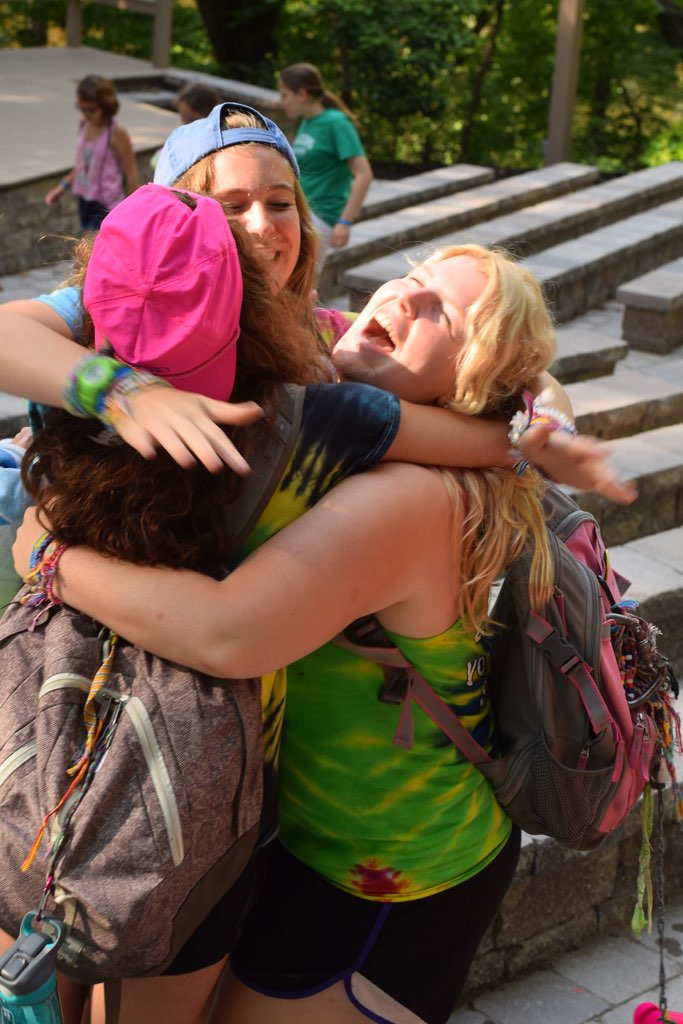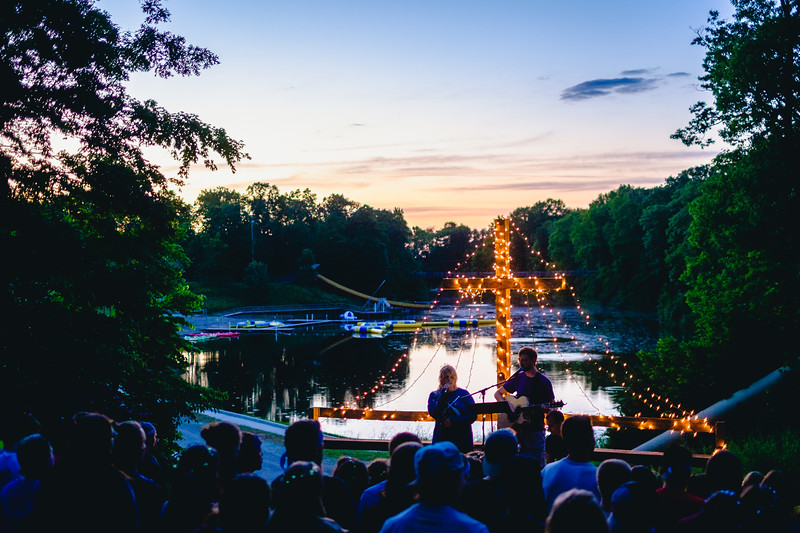“Why do you keep going back to camp?” This question was obviously on the minds of various friends and family members, based on how often I was asked.
It was a question that was at times accompanied by an eye roll, conveying that the appropriateness of my work as a camp counselor had somehow timed out as I approached my 5th summer. I had, at that point, completed my undergrad and was halfway through my Masters, and yet, I wasn’t done with camp. And this is what didn’t make sense to my friends.
 Photos courtesy of the writer, Lauren Baney, third from the left.
Photos courtesy of the writer, Lauren Baney, third from the left.
Through the lens of my Instagram account, camp probably looked to them like running around the outdoors, wearing weird costumes, swimming in lakes, and an easy paycheck.
What does camp look like through the eyes of a counselor? Running around the outdoors, wearing weird costumes, swimming in lakes, and an exhaustingly-earned paycheck. But there is something more, that those who are a part of camp know, that keeps people returning every summer and catching that “summer camp bug.”
Why DO counselors return to camp?
What is it about marching kids of all ages through the mud and muck to the dining hall on a rainy evening, sleep outs in the middle of the woods, or singing about a man named Silly Willy that creates such enduring memories? Despite the mosquitos, homesick kids, reluctant hikers, the lack of air conditioning, sleep deprivation, and the permanent layer of mud, we come back; some of us year after year.
To the outsider, camp appears to be a three ring circus of constant activity with the counselor as the ringmaster, organ grinder and peanut salesman. That precisely is what I thought when I signed my contract for my first summer. And there is a lot of truth to that. There are lakes, zip lines, water trampolines, high ropes courses, campfires, and endless s’mores. Camp is the only places that I know of that it is normalized to stand on your chair at lunch and sing about flies, wear tutus multiple times a week, and play leapfrog all the way to the pool. There is a freeness for goofiness, like costume relays, where you run across a field in the silliest clothes.
I have seen groups of teenagers using their creativity to find the goofiest way to dance in front of their peers. Guards are let down, “too cool” cards are ripped and shredded, and real authentic personalities are welcomed and celebrated. Like I said before, camp looks like a blast! But, at the core, camp looks like a lasting impact and lives changing.
Being a counselor at the same camp I grew up attending, I knew it was a special place. It was a place of comfort that I could be myself. When I returned home as a kid, after a week at camp, I always felt the best version of myself and cleared of my daily distractions. At the time, I believed this was from just being relaxed and having fun. Coming on as staff, I was fully prepared for the goofy games, lunchtime chants, and silly campfire songs. I knew I would make some friends and have fun. What I was not prepared for, was the way that I would see myself, my fellow counselors, and my campers grow and learn from each other.
The Journey Begins
Coming off my freshman year of college, ready for my first summer as a counselor, I was desperately searching for belonging and struggling to find self-worth. My first night at a team building training, we went around the circle in a discussion. We had the opportunity to hear compliments and acknowledgments from other staff members. Understanding the love that was offered to me from people who had known me for a day blew me away. That was just a small glimpse into what it meant to be a part of this family.
Becoming part of my camp family is still one of the most fortunate things to happen to me. Now, a few years since my last summer on staff, I still have strong connections. I have friends that I can fall right back into step with, after months of not seeing. People who I know have my back and will drop everything to support me in time of need. As cliche as this may sound, some so many people do not get to experience these types of precious and giving relationships. When I look back at my time at camp, the relationships formed will always be one of the most impactful takeaways.
Key Lessons of Camp
Throughout Western culture, some have become concerned that soft skills being underdeveloped and empathy is lacking in necessary human interaction. Isolation is normalizing, connection is decreasing, while self-serving behaviors increase. If that’s true, camp is definitely the antidote. Camp has soft skills development ingrained into the structure of its programming and philosophy. Little things, like family style dining including the “you kill it, you fill it” rule, where if you take the last serving of a dish, you go through the cafeteria line to get it refilled.
Another example is team building courses and activities throughout the grounds that are accessible for cabins to do together. Many courses focus on communication, listening, and idea exchanging. At camp, kindness is not only expected, but it is also a cool thing to do. Bullying is not only unallowed, but it is also not even an option. I believe this is why such deep relationships are formed while at camp. Unlike any other place in the world, I think that the way people were designed to connect and treat each other is put into daily practice. Counselors demonstrate this to their campers with their friendships to other counselors so well. Campers look up to their counselors and want to be just like them.
One of my favorite stories that fall in this category is when I told my campers that I was never an official girl scout and that I was not asked to prom my junior year of high school. It was two different silly conversations that happened at dinner. Little did I know that my off hand comments led to them plotting with my co-counselor to create a big surprise me. Later in the week, the girls were acting a little suspicious and giggly. We had just gotten off a canoe trip when they asked if they could blindfold me. I was a little confused but decided to go along with it… They had set up an entire girl scout bridging ceremony in the woods and made me a sash out of construction paper. The sash has badges of many of my favorite things and things they knew about me. At the end of the ceremony, they blindfolded me again, shoved a dress-up dress over my head, and had a fellow counselor ask me to the junior prom. I was blown away by their creativity and attention to detail. They were so excited to surprise me, and I felt so loved by their gesture.
Today’s kids have more chance to be disconnected than any other generation. The rise of social media and technology has taken away from the time being outdoors and spending time with friends and loved ones. A 2018 Common Sense media report found that 61% of would teens instead spend time with a friend by texting, social media, or video chatting, with 32% preferring to spend time with their friends in person. It seems the disconnection speaks for itself. Without getting too bogged down in the negative details or sparking an argument about social media use, let’s look back at how camp combats the disconnection problem.
At my camp, 10-11 new campers came each Sunday. There were new faces, new names, new personalities to learn and to navigate. Counselors are experts in fostering inclusive and safe spaces. But, there was always a bit of awkwardness and timidness that came with the first day of a new week. Ask any camp staff member. I am sure many could go on and on about the struggle that the first day could be. One of my favorite parts of a counselor was to see how the shells and walls that people came in with were shattered, and friendships were formed. Some weeks took longer than others, but many times by the end of the first night, I would see connections being made and just continue to grow as the week went on.
These connections are not accidentally formed. The kids have to use their communication and other interpersonal skills to adapt to the new people they are around. This is what we need to instill in kids. We need people to grow up and take the jobs as teachers, government workers, camp counselors, youth workers, doctors, lawyers, and be able to see the value and dignity of another person. Empathy is working to understand where someone else is coming from. Some may argue, it is the most crucial skill to develop for success.
“Learning to stand in somebody else’s shoes, to see through their eyes, that’s how peace begins. And it’s up to you to make that happen. Empathy is a quality of character that can change the world.” – Barack Obama
It is not about being right. It is not about being better. It is about seeing someone and saying “you matter” and showing respect and love. This is what happens at camp every day, without even realizing it at times. It is demonstrated and woven into the fun, love, and goofiness that are the camp activities. Many people go to camp with the intention of fun, but they come away with a feeling of love and acceptance.
While I was a counselor, a lot of cabins had each camper put a “love tank” on their bunk. This was a simple paper bag that the camper could decorate and their cabinmates and the opportunity to write notes of love and encouragement throughout the week. Today under my bed, you can find a shoe box filled with love tank notes from my years at camp.
There is a lot of factors pouring into what makes camp this place of solace, recovery, and growth. It can serve as a break from everyday life and a therapeutic outdoor experience. Every camp has core values that they emphasize. It is a tradition that at the end of the week each camper chose an area in their life that they wanted to improve on during the coming school year. They had the options: friendship, joy, trust, faith, initiative, or responsibility. The personal challenge gives ownership to the campers, and they were given a bead to remember the problem throughout the school year.
I love camp more than I have loved anywhere other than my family’s home. What I’ve learned and done at camp has impacted my life. It has pushed me more, taught me more, and changed me more than anything I have previously been a part of. It taught me that my strengths are part of a bigger plan and gave me practice using them. After several summers of camp, I asked my parents, “How have you seen camp change me?”. Their answer: “You think more about others. You seem more comfortable in who you are. You are more accepting of others.”
In no way am I saying that I am the yardstick of kindness and love. But, isn’t that what kind of society we want? Aren’t qualities such as acceptance, love, security, and caring admirable to strive for? I know for me personally, I want to continue to grow in those areas.
Currently, I work at a runaway and homeless youth shelter. I meet kids daily, and many times think, “man, I wish this kid could experience camp.” A lot of these youth come from a home where love is not given freely, hugs are not available, and they feel like they do not matter. I think about what one week of camp could have the potential to do and teach them.
As I sit and write, it feels like I cannot give justice to how much of an impact camp has had on my life. How I have witnessed the same in others’ lives. However, I can think of story after story comes to mind, where I saw camp build up a kid and say “you matter.” Camp meets you where they are at, and every staff member has a commitment to love those kids.
Camp is a Place Where…
Kids are poured into and told they have skills and a purpose in this world to go out and be the torchbearer of light to others. They are told that they can make a difference.
Kids can try something new without feeling pressure to adhere to societal norms or what is deemed as cool. The soccer star can try crafts or show choir clinic. The drama star can try basketball or ultimate frisbee.
Some campers have the chance to hold a chicken for the first time or pet an alpaca. Camp is also the place where some learn what an alpaca is.
The victim of bullying feels safe.
The victim of abuse from her parents became the most popular girl at camp, championed by her cabinmates, received a standing ovation for singing in front of the cafeteria at the end of the week.
The 15-year-old boy who had never been to a swimming pool and didn’t know how to swim, had his entire cabin forgo water polo during swim time to help him reach the next swim band level.
The girl struggling with an eating disorder is told she is beautiful and worth more than a number on a scale.
The boy who never had a father, look at his counselor and see a male role model for his first time.
The girl whose self-harm scars overtake her legs, can wear shorts and not feel shame, but find love and support.
Summer after summer, lives are changed for the better.
Camp is the place where I, and many others, learned that we were made from love, to be loved, and to give love. And for that, I am grateful.
This post was written by Lauren Baney.



